Latest News
19 November 2021
Delft scientists put the spotlight on combined capture and conversion of CO2
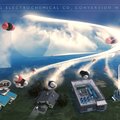
CO2 can be electrochemically converted into valuable chemicals and fuels. Both capturing and converting CO2 do, however, require a lot of energy. An optimal combination of both processes can save a lot of energy and reduce the loss of materials. The TU Delft research group of David Vermaas recently published a paper in Nature Catalyses, summarising the various ideas on how to achieve this.
18 November 2021
The Best Tech Idea of 2021: processor and memory in one
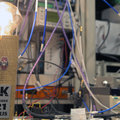
Said Hamdioui's 'computation-in-memory' is the Best Tech Idea of 2021 according to the jury of KIJK magazine. The jury praised Said's computer architecture for making numerous new innovations possible: "the Internet of Things requires large amounts of computers that all must be very energy-efficient. Memristors can be the basis for this and that makes this idea, however young, very important."
17 November 2021
Delft Design alumnus Jerry de Vos wins James Dyson Award sustainability prize
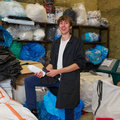
With his Plastic Scanner, Jerry de Vos has designed a handheld device that can tell you quickly what kind of plastic something is made of. Knowing this is crucial for better reuse and recycling of the growing worldwide plastic waste.
11 November 2021
Zhuo-ming Shia: TU Delft Best Graduate
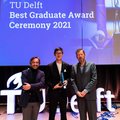
Today, at the online TU Delft Best Graduate Award Ceremony 2021, eight recently graduated engineers presented their research and results of their excellent master thesis. Zhuo-ming Shia, graduate of the Faculty of Architecture and the Built Environment received the prestigious title TU Delft Best Graduate 2021.
11 November 2021
The North Sea is ready for its close-up
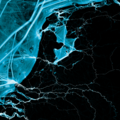
09 November 2021
Looking between the hidden layers of The Night Watch
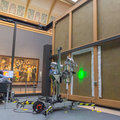
TU Delft researchers Andrei Anisimov, Roger Groves and Nan Tao used their special research equipment in the Rijksmuseum last week, to make the invisible structure of The Night Watch visible.
08 November 2021
Rain Showers grow in size and intensity

05 November 2021
TU Delft Education Heroes in the spotlight during Education Day on 4 November

04 November 2021
Scanning a single protein, one amino acid at a time
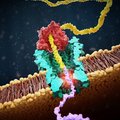
Using nanopore DNA sequencing technology, researchers from TU Delft and the University of Illinois have managed to scan a single protein: by slowly moving a linearized protein through a tiny nanopore, one amino acid at the time, the researchers were able to read off electric currents that relate to the information content of the protein. The researchers published their proof-of-concept in Science today. The new single-molecule peptide reader marks a breakthrough in protein identification, and opens the way towards single-molecule protein sequencing and cataloguing the proteins inside a single cell.
04 November 2021
QuTech creates a time crystal
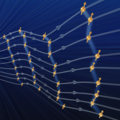
Researchers from QuTech created a time crystal, a novel exotic quantum phase of matter, using a quantum computer based on diamond. Together with a simultaneous experiment by Google, the results shed new light on the physics of out-of-equilibrium quantum systems. The team reports their findings today in Science.
